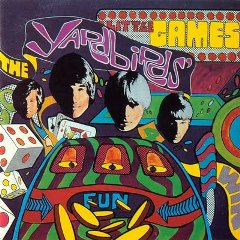Yardbirds - Little Games (1967)
Yardbirds - Little Games (1967)

01. Little Games 02. Smile on Me 03. White Summer 04. Tinker, Tailor, Soldier, Sailor 05. Glimpses 06. Drinking Muddy Water 07. No Excess Baggage 08. Stealing, Stealing 09. Only the Black Rose 10. Little Soldier Boy + 11. Puzzles [1991 U.S. Stereo Mix] 12. I Remember the Night [1991 U.S. Stereo Mix] 13. Ha! Ha! Said the Clown 14. Ten Little Indians [1991 U.S. Stereo Mix] 15. Goodnight Sweet Josephine [Version 1 -- Unphased] 16. Think About It 17. Goodnight Sweet Josephine [Phased U.S. Single Version] 18. Most Likely You Go Your Way (I'll Go Mine) [BBC Sessions] 19. Little Games [BBC Sessions] 20. Drinking Muddy Water [BBC Sessions] 21. Think About It [BBC Sessions] 22. Goodnight Sweet Josephine [BBC Sessions] 23. My Baby [BBC Sessions] 24. White Summer [BBC Sessions] 25. Dazed and Confused [As The New Yardbirds] [BBC Sessions]
Personnel:
- Chris Dreja – bass
- Jim McCarty – drums, percussion, backing vocals
- Jimmy Page – guitar
- Keith Relf – harmonica, percussion, vocals
+
- Nicky Hopkins – keyboards
- Clem Cattini – drums
- John Paul Jones – bass, cello on "Little Games", and string arrangements
If almost any group other than the Yardbirds had released Little Games, it would be considered a flawed but prime late-'60s psychedelic/hard rock artifact instead of a serious step backward, and even a disappointment. Not that it's a bad album -- it just lacks the cohesion and polish of the group's preceding album, The Yardbirds (aka Over Under Sideways Down aka Roger the Engineer). And well it should -- although they were nominally the same group they'd been a year earlier, in reality the Yardbirds had undergone a massive shift in personnel since the release of The Yardbirds. The departure of original bassist Paul Samwell-Smith in June of 1966 set off a sequence of personnel shifts, bringing guitarist Jimmy Page into the lineup, first on bass and then on lead guitar in tandem with Jeff Beck (while rhythm guitarist Chris Dreja switched to bass), until Beck's exit in November 1966 for a solo career left Page as their lone guitarist. At the same time, the band was forced -- by the failure of its single "Happenings Ten Years Time Ago" -- to accept a new producer in the guise of Mickie Most, who was currently enjoying huge success with Donovan and had a formidable string of hit singles to his credit with Herman's Hermits, the Animals, et al. the Yardbirds' blues roots and progressive tendencies clashed with Most's pop/rock preferences, and the two sides never did reconcile, much less mesh for more than a few minutes on the finished album. To top it off, the bandmembers were finally seeing some serious money for their live performances (ironically, just as they were hanging on by their fingertips to a recording contract), courtesy of their new manager, Peter Grant, and so were committed to lots of stage work. The overall result was a hastily done and uneven LP with flashes of brilliance. Apart from the title single -- one of the better compromises between where the group had been and where Most wanted to take them -- the two best cuts were "White Summer" and "Drinking Muddy Water," excellent showcases for the experimental and bluesy sides of the band, respectively; both, curiously, were also virtually thefts, "White Summer" lifted from Davy Graham's arrangement of the 300-year-old "She Moves Through the Fair" and "Drinking Muddy Water" a rewrite of "Rollin' and Tumblin'," a blues standard usually attributed to McKinley Morganfield (aka Muddy Waters). The best of the rest included "Only the Black Rose," a strangely beautiful, moody acoustic psychedelic piece; "Stealing, Stealing," an unusual (for this band) pre-World War II-style acoustic blues complete with kazoo; and "Smile on Me," a hard, bluesy number that could have come from any part of the group's history. The attempt at a catchy rocker, "No Excess Baggage," however, needed more work and better involvement from vocalist Keith Relf; the power chord-laden "Tinker, Tailor, Soldier, Sailor" was a great piece of psychedelic pyrotechnics, but it also sounded more like the Who than the Yardbirds, though it did introduce Jimmy Page's violin bow discourses on the guitar; and "Little Soldier Boy" was a silly psychedelic pop piece more appropriate to the Monkees than the Yardbirds. The album was unintentionally revealing, in hindsight, of the growing schism within the band, as Relf and drummer Jim McCarty's growing embrace of flower power and hallucinogenic drugs came to be reflected in the trippier numbers such as "Glimpses," whereas Jimmy Page was starting to take his blues slower and flashier, and into wholly new territory with that violin bow. One more album or a proper concert might've sealed the deal for the Yardbirds, but instead one more tour sealed the fate of the band. ---Bruce Eder, Rovi
download: uploaded anonfiles mega 4shared mixturecloud yandex mediafire ziddu
Last Updated (Wednesday, 24 July 2013 15:23)








